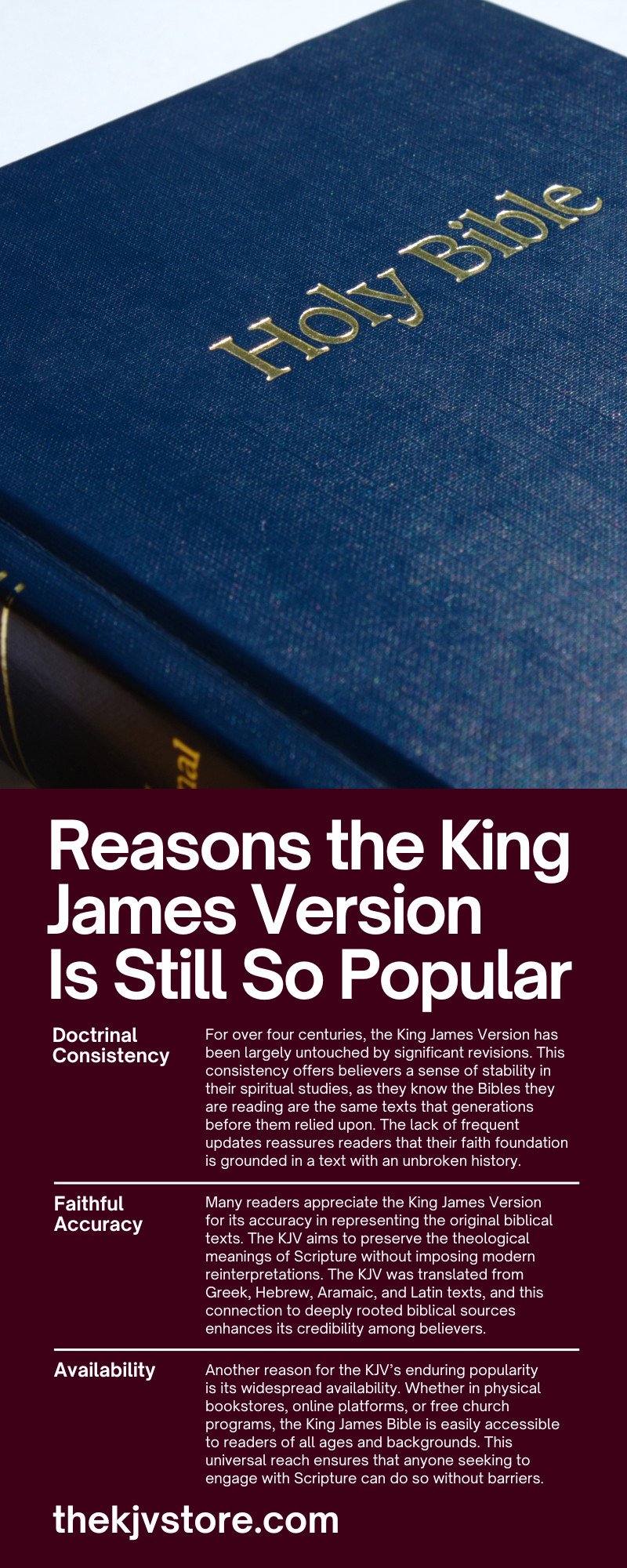Reasons the King James Version Is Still So Popular

The King James Version (KJV) has been used for centuries in churches, homes, and scholarly circles. But what is it about the KJV that gives it such timeless appeal? So much about the world has changed since this Bible was first published in 1611, yet this translation continues to hold a prominent place in the hearts and minds of many Christians. Explore the most compelling reasons the King James Version is still so popular.
Doctrinal Consistency
For over four centuries, the King James Version has been largely untouched by significant revisions. This consistency offers believers a sense of stability in their spiritual studies, as they know the Bibles they are reading are the same texts that generations before them relied upon. The lack of frequent updates reassures readers that their faith foundation is grounded in a text with an unbroken history.
Additionally, the King James Bible has been widely endorsed by countless pastors, theologians, and scholars throughout history for its steadfast adherence to traditional biblical teachings. It is a trusted resource for those seeking a cohesive theological perspective.
Faithful Accuracy
Many readers appreciate the King James Version for its accuracy in representing the original biblical texts. The KJV aims to preserve the theological meanings of Scripture without imposing modern reinterpretations. The KJV was translated from Greek, Hebrew, Aramaic, and Latin texts, and this connection to deeply rooted biblical sources enhances its credibility among believers.
The KJV’s translation choices often prioritize reverence and theological depth over colloquial or simplified phrasing, which strengthens its appeal to those who fear the loss of essential meaning in other translations. For those studying Scripture closely, the KJV is seen as a foundational translation that maintains the integrity of God’s Word.
Possible Issues With Other Translations
Modern Bible translations often face criticism from traditionalists, theologians, and certain denominations for oversimplifying language, which some believe dilutes the theological depth found in the original texts. Critics also point out that when translators prioritize accessibility over theological depth, complex theological concepts can be oversimplified, leading to a loss of nuanced understanding. This approach risks altering the original meaning of the text, potentially diminishing its spiritual and doctrinal integrity. These challenges create concerns among traditionalists who view the KJV as a more faithful representation of biblical truth.
Availability
Another reason for the KJV’s enduring popularity is its widespread availability. Whether in physical bookstores, online platforms, or free church programs, the King James Bible is easily accessible to readers of all ages and backgrounds. This universal reach ensures that anyone seeking to engage with Scripture can do so without barriers.
Additionally, the variety of KJV editions available, ranging from compact pocket versions to beautifully illustrated family Bibles, appeals to a broad readership. Scofield Bibles contain the entirety of the King James Version with extensive notes, cross-references, and theological commentary by Cyrus I. Scofield. Its detailed annotations and clear framework make it an invaluable resource for Christians who wish to explore the Bible’s teachings more comprehensively.
Reverential Language
Reverence refers to a deep sense of respect and awe, often directed toward something sacred or profoundly significant. The word originates from the Latin revereri, which means, among other things, “to stand in awe of.” Christians strive to be reverent about God’s Word because it is divinely inspired and holds the ultimate truth for guiding one’s life. Reverence reflects the believer’s deep respect and gratitude for the sacred teachings that provide wisdom, comfort, and a connection to God.
Few translations can rival the majesty of the KJV’s language. Its formal and archaic phrases, such as “Thou art” or “Verily, verily, I say unto thee,” evoke a sense of reverence when reading Scripture. This traditional tone resonates deeply with believers, as it reflects their understanding of Scripture as something sacred and set apart from everyday speech.
To many readers, the KJV’s language creates a spiritual atmosphere that modern translations rarely replicate. Each passage feels intentionally poetic and dignified. Those reading the Psalms or Gospels, for instance, often find that the timeless phrasing leads to a sense of awe and worship during personal or communal Bible study.
Personal Connection
The long-standing use of the KJV in churches and Christian households fosters a strong sense of authenticity. For generations of believers, the King James Bible has been the version they grew up hearing and studying. This familiarity establishes an emotional and spiritual connection that feels deeply rooted in their faith tradition.
For many, using the KJV is more than reading Scripture—it’s participating in a historical and spiritual legacy. They associate the translation with pivotal moments in their lives, from Sunday sermons to personal Bible studies.
Historical Significance
The King James Version’s historical influence in the English-speaking world cannot be overstated. Published in 1611, it became one of the earliest widely read English translations and played a pivotal role in shaping English-speaking Christianity. Its longevity has solidified its reputation as a credible and enduring representation of God’s Word.
Here are some key points that highlight the historical significance of the King James Version Bible:
- The KJV was instrumental in standardizing the English language during the 17th century.
- It served as a unifying religious text amid the societal and theological divisions of its time.
- The translation influenced countless literary works, becoming a cultural touchstone in English literature.
- It made Scripture accessible to the general public, empowering personal relationships with God.
- The KJV played a key role in shaping Protestant identity and discourse in English-speaking communities.
Poetic and Majestic Literary Style
One of the most celebrated features of the KJV is its breathtaking literary style. Its rich, majestic rhythm has inspired readers and writers alike, contributing to its reputation as a masterpiece of English literature. Books like Psalms and Ecclesiastes are particularly loved for their poetic cadences.
Beyond personal reading, this literary elegance has ensured the KJV’s use in grand ceremonial settings, like weddings, funerals, and public worship. Its precise yet evocative language leaves a lasting impression, further cementing its role as a timeless and dignified translation.
Known for its unwavering doctrinal foundation and faithful translation, the King James Version Bible keeps Christians anchored in God’s Word. Its reverential language and widespread accessibility make it a vital resource for both personal study and worship. People cherish the personal connections they share with a text ingrained in Christian heritage. Centuries after its first publication, the KJV stands as a living expression of faith and tradition.

